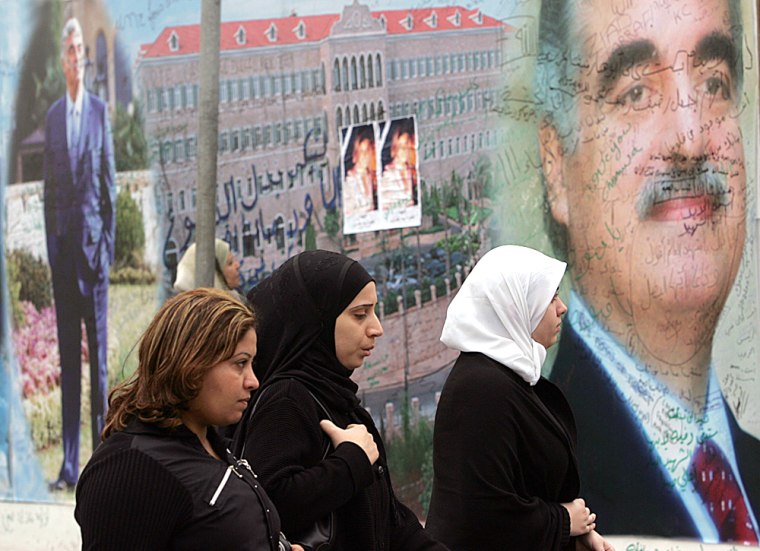Lebanon, facing mounting domestic and international pressure to find the assassins of former Prime Minister Rafik Hariri, said Sunday it will cooperate with U.N. investigators but stuck to its rejection of a full-fledged international inquiry.
Hariri was killed a week ago Monday in a massive bomb explosion as he was driven through central Beirut. The blast killed 16 others and wounded more than 100.
Lebanese Parliament Speaker Nabih Berri and Interior Minister Suleiman Franjieh said Sunday that Lebanon welcomes the help of an international investigating team, provided that it comes within the framework of Lebanese sovereignty.
“The government will cooperate because it is in its interest, within its sovereignty, to unveil the truth,” Berri said at a meeting of pro-government politicians held at his residence. Berri added that Lebanon’s president sent a reply to the United Nations about the international investigators.
‘...will not compromise our sovereignty’
Franjieh said the government “(welcomes) any international investigation, but we will not compromise our sovereignty ... We have a government and it will carry out an investigation.”
The Lebanese decision to work with the U.N. team but not allow it to control the investigation raises tension with the world body, which also is pressuring the nation’s main powerbroker, Syria, to withdraw troops. Hariri’s family, the United States and France have pressed for an international probe.
Many opposition leaders and Hariri’s supporters have accused the Lebanese government and Syria of involvement in the assassination. Both governments have denied the allegations and condemned the attack.
Syria has 15,000 soldiers in Lebanon and is under increasing U.S. and U.N. pressure to withdraw.
Activists concerned
Syrian political activists on Sunday supported calls for their country to withdraw the troops but expressed concern Sunday at the level of anti-Syrian protests in Lebanon.
U.N. Secretary-General Kofi Annan decided Friday to send a team led by Ireland’s deputy police commissioner to Beirut in the next few days to investigate Hariri’s assassination.
A U.N. official in Beirut, speaking on condition of anonymity, refused to talk about the team’s mission and said he didn’t know when the U.N. investigators would arrive in Beirut.
Jordan’s King Abdullah II, who had close ties with Hariri, also called for an independent team to investigate the assassination.
A previously unknown Islamic militant group has claimed responsibility, but Lebanon’s Interior Ministry suggested the explosion was caused by a suicide bomber with ties to an international network.
Hariri, a self-made billionaire businessman, was credited with rebuilding Lebanon after its 1975-90 civil war, and his grave has become a pilgrimage destination.
On the ground, little confidence
Pro-Syrian President Emile Lahoud has vowed that the government would “uncover the circumstances of the ugly crime.” But many Lebanese have little confidence in an investigation by a government that has a record of failing to find those responsible for assassinations.
After Monday’s bombing, Syrian President Bashar Assad replaced the chief of military intelligence, who commands Syrian agents in Lebanon, with his brother-in-law.
Meanwhile, a statement signed by more than 35 Syrian intellectuals and human rights activists addressed to their Lebanese counterparts said: “We support your demand for the withdrawal of the Syrian army from Lebanon and in correcting the Syrian-Lebanese relationship.”
“But we are extremely painful and angry to see and hear that some Lebanese are insulting Syria and its people without (it) being guilty, and attacking miserable Syrian workers, who are searching for their living” in Lebanon, it said.
